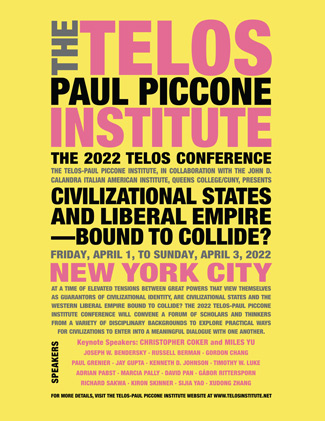By Telos Press · Thursday, May 12, 2022 Writing at the National Interest, Alex Hu reports on the recent 2022 Telos Conference, entitled “Civilizational States and Liberal Empire—Bound to Collide?” An excerpt from the article:
 How do obscure ideas from the ivory tower enter the halls of power? In 2019, London School of Economics professor Christopher Coker published a book on “civilizational states,” describing a new ideological threat to the world order emerging from Russia and China. Three years later, on April 1-3, 2022, four policy advisors to Secretary of State Mike Pompeo spoke at a conference in New York City on the theme of “Civilizational States and Liberal Empire—Bound to Collide?” How do obscure ideas from the ivory tower enter the halls of power? In 2019, London School of Economics professor Christopher Coker published a book on “civilizational states,” describing a new ideological threat to the world order emerging from Russia and China. Three years later, on April 1-3, 2022, four policy advisors to Secretary of State Mike Pompeo spoke at a conference in New York City on the theme of “Civilizational States and Liberal Empire—Bound to Collide?”
Convened by Telos, a quarterly journal—oddly enough—for “critical theory of the contemporary,” the conference attracted a crowd of around thirty academics and intellectual oddballs. Not much consensus was reached. The Pompeo officials themselves disagreed. But their very participation at the event confirms that Coker’s ideas have caught on in a big way.
Continue reading →
By Telos Press · Tuesday, May 3, 2022 In his new book, The Travails of Trumpification, a series of critical essays written over the course of Donald J. Trump's presidency, Timothy W. Luke explores how the recent twists and turns in the civic life of the United States have precipitated a dangerous transformation of American political culture. Tim recently talked with Mark S. Weiner about the book and the current precarious state of U.S. politics.
Continue reading →
By Telos Press · Monday, April 25, 2022 The Telos Student Seminars provide a forum for students around the world to engage with critical theory by discussing a common set of paired texts from Telos—one current essay and one pertinent essay from our archives. In our second cycle of seminars, we are discussing Huimin Jin’s “Cultural Self-Confidence and Constellated Community: An Extended Discussion of Some Speeches by Xi Jinping” (Telos 195, Summer 2021) and an excerpt from Cornelius Castoriadis’s “The Crisis of Western Societies” (Telos 53, Fall 1982). The following reports are from the Telos Student Seminars groups in Budapest, Hungary, and Nanjing, China. For more details about the Telos Student Seminars, including summaries of the two essays under discussion, click here.
Continue reading →
By Russell A. Berman · Monday, March 28, 2022 One of the surprising aspects of the Ukraine War is that it came as a surprise. After the devastation that Russia wreaked in Chechnya, after the invasion of Georgia, after the occupation of Crimea—and the list goes on: after Russia’s complicity in the destruction of Aleppo and the violence of the Wagner Group deployments especially in Africa, and, most obviously, after Putin’s explicit declaration of his intent, the West could nevertheless watch Russia prepare for the invasion and still believe that it would not happen. Before the invasion would have been the time to arm Ukraine. Instead the West succumbed to a Chamberlain-like logic of self-delusion: if we do nothing, the aggressor will dissipate. The wishful thinking of liberalism is a scourge. It remains to be seen whether the brutality of Russian violence will change that mindset in the foreign policy elite. Optimism is not warranted.
Continue reading →
By Telos Press · Friday, March 25, 2022 The Telos Student Seminars provide a forum for students around the world to engage with critical theory by discussing a common set of paired texts from Telos—one current essay and one pertinent essay from our archives. In our second cycle of seminars, we are discussing Huimin Jin’s “Cultural Self-Confidence and Constellated Community: An Extended Discussion of Some Speeches by Xi Jinping” (Telos 195, Summer 2021) and an excerpt from Cornelius Castoriadis’s “The Crisis of Western Societies” (Telos 53, Fall 1982). The following report is from the Telos Student Seminars group in Haifa, Israel. For more details about the Telos Student Seminars, including summaries of the two essays under discussion, click here.
Read the report here.
Continue reading →
Is Putin the madman they say? Or is he, to the contrary, somebody who coldly calculates his rational self-interest, in the manner of Thomas Hobbes’s legendary sovereign power or Niccolò Machiavelli’s eponymous prince?
In short, is it surrealism, rooted in deranged psychological fantasy, or Realism, grounded in hardcore political science, that we are up against?
Or could there be an alternative way of looking at it, one less familiar, more specific, grown-up, and intellectually challenging, if also less emotionally reassuring?
Let’s try putting in jeopardy our own “moral clarity” for a change. After all, while every war must perforce seem “needless” to beautiful souls, just as any person in charge of a modern state could be tagged a “killer” by children, nevertheless, military conflict, experience teaches, will not always be so readily averted.
If only for the sake of a diverting thought experiment, let’s examine in a bit more detail some possibilities—in hopes of dispelling a portion of the gloom that engulfs us in these dark times.
Continue reading →
|
|
How do obscure ideas from the ivory tower enter the halls of power? In 2019, London School of Economics professor Christopher Coker published a book on “civilizational states,” describing a new ideological threat to the world order emerging from Russia and China. Three years later, on April 1-3, 2022, four policy advisors to Secretary of State Mike Pompeo spoke at a conference in New York City on the theme of “Civilizational States and Liberal Empire—Bound to Collide?”


